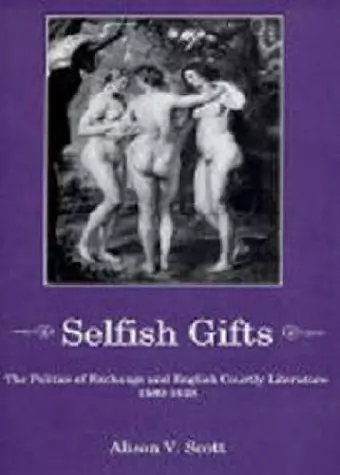Selfish Gifts
The Politics of Exchange and English Courtly Literarture, 1580-1628
Format:Hardback
Publisher:Fairleigh Dickinson University Press
Published:1st Dec '05
Currently unavailable, and unfortunately no date known when it will be back

Engaging with a wide range of texts on gift-theory, extending from Senecas De Beneficiis to Derridas Given Time, Selfish Gifts examines the importance of gift ethics and the rhetoric of honorable giving to the literature of late Elizabeth and early Stuart England. It demonstrates that the ideal of the freely given and disinterested gift shaped the language of early modern clientage, along with literary representations of patrons and patronage systems during this period. Selfish Gifts examines how early modern clients moved quickly and strategically to assimilate the language of competition and equality, characteristic of an emerging market economy, within their existing discourses of gift exchange, in order to maximize the rewards they might induce from an increasingly diverse group of patrons. To give is to exercise power and thus, as numerous modern gift-theorists and anthropologists elucidate, the gift is implicitly self-interested even as it derives value from appearing altruistic; nowhere is this paradox more significant than in a patronage economy such as that which shaped literary production in early modern England. In pursuing that paradox and its implications, Selfish Gifts highlights crucial connections and cultural tensions between political and sexual giving, between 'giving' truth and flattery, between the sovereignty and subjection of gift donor/recipient, and between strategic and so-called 'sacrificial' giving. Those tensions are examined in the context of the latter years of Elizabeth Is rule, through the contrasting reign of James I and up to the early Caroline period. Selfish Gifts demonstrates the prominence of the gift ideal in Renaissance England and suggests the disturbing social and political consequences for those who give contrary to that ideal by bestowing self-interested gifts, by refusing to give, or by giving egotistically. The book establishes the centrality of gift theory to the discourses of patronage, friendship, and sovereignty, sugg
Again and again her volume resists easy, simplistic explanations in favor of richly complex analyses that emphasize the complications of living and writing in a fluidly competitive but rigidly hierarchical society. Of particular interest is her opening application of some of her ideas to Shakespeare's King Lear; here her comments on history and society are effectively blended with detailed discussion of the play as a work of art, and the result is an illuminating look at a much-analyzed tragedy. In discussing Lear and also throughout her study, Scott manages to explore complicated ideas in lucid language, even bringing Derrida into her commentary in ways that clarify rather than obfuscate. Indeed, the book benefits from clarity of all kinds, including its sensibly chronological structure, its effective use of summary sentences and summary passages, its detailed (and often richly topical) index, and its admirable ability to integrate historical exposition and literary commentary. -- Editors' Choices * Ben Jonson Journal *
ISBN: 9781611473186
Dimensions: 245mm x 168mm x 22mm
Weight: 606g
303 pages